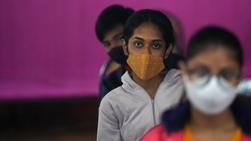 Indian teens wait to receive their vaccination for COVID-19 at a government school, in New Delhi, India on Jan 3, 2022. (MANISH SWARUP / AP)
Indian teens wait to receive their vaccination for COVID-19 at a government school, in New Delhi, India on Jan 3, 2022. (MANISH SWARUP / AP)
JERUSALEM / NEW DELHI / ANKARA / TOKYO / BANDAR SERI BEGAWAN / BEIRUT / BANGKOK / SYDNEY / ISLAMABAD / ULAN BATOR / JAKARTA / KOLKATA / HANOI - Indian megacities Delhi, Mumbai and Kolkata are experiencing a surge in COVID-19 cases, although without a corresponding rise in hospitalizations, but fears are growing about a spread to rural areas in coming days.
India reported 90,928 new daily COVID-19 cases on Thursday, up nearly four-fold since the start of the year, mostly from cities where health officials say the Omicron variant has overtaken Delta. The bulk of those infected have shown no or only mild symptoms and have recovered quickly at home, officials said.
The federal health ministry on Wednesday identified Delhi, Mumbai, Kolkata, Chennai and Bengaluru as some of the main regions of concern, although state officials worry the disease will soon spread to the countryside where health facilities are weaker.
Kolkata, a city of about 15 million, accounted for half of the new cases in the eastern state of West Bengal until a few days ago, but cases are now rising in neighbouring districts. The state has reported one of the highest rates of infections in India.
"We are watching the situation in the districts and rural belts where the numbers are also growing," said Ajay Chakraborty, director of the West Bengal health services who has isolated himself at home after contracting the virus.
Many COVID-19 beds in Kolkata were still empty, Chakraborty said. In the government-run Infectious Diseases and Beliaghata General Hospital, only 75 admissions were recorded on Tuesday despite more than 9,000 new cases, he added.
In the west, Mumbai recorded a new daily infection peak of 15,166 on Wednesday, well up on its previous high of just over 11,000 hit last year. Nearly 90 percent of new patients had shown no symptoms and only 8 percent were hospitalized, city officials said in a daily health bulletin.
COVID-19 cases nearly doubled in a day in Delhi to 10,665 on Wednesday, but the state said only 7 percent of its COVID beds were occupied.
Federal health officials, however, have warned even a large number of mild cases could put pressure on the health system.
India has confirmed at least 2,135 Omicron cases and one death linked to the variant, in an elderly man who was suffering from diabetes.
ALSO READ: India's Delhi imposes weekend curfew as COVID-19 cases surge
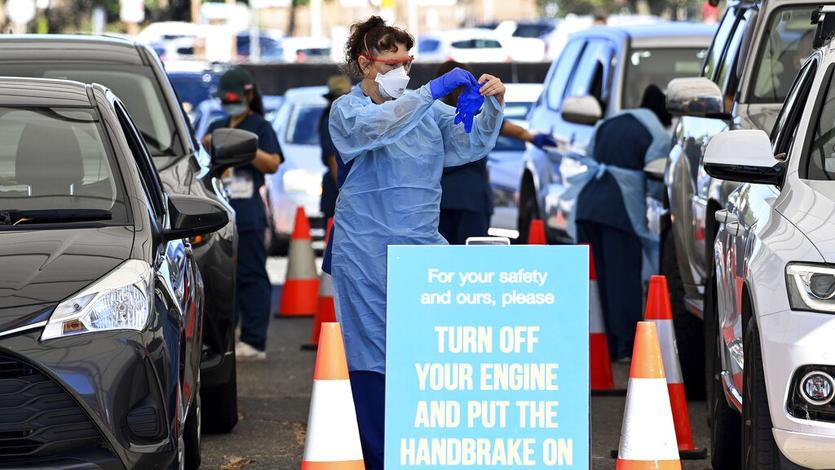 Health care workers administer COVID-19 tests at a drive-through clinic in Sydney on Dec 31, 2021. (BIANCA DE MARCHI / AAP IMAGE VIA AP)
Health care workers administer COVID-19 tests at a drive-through clinic in Sydney on Dec 31, 2021. (BIANCA DE MARCHI / AAP IMAGE VIA AP)
Australia
Fuelled by the highly transmissible Omicron variant, Australia's daily coronavirus infections soared to a fresh peak on Thursday, overwhelming hospitals, while isolation rules caused labour shortages, putting a strain on businesses and supply chains.
With Thursday's count still incomplete, Australia so far has reported 72,392 new infections easily exceeding the high of 64,774 set a day earlier. Western Australia is due to post its new cases later.
Prime Minister Scott Morrison, facing a federal election before May, is under pressure over his handling of the Omicron outbreak due to stock shortages of antigen tests and hours-long wait times at testing centres.
Authorities have relaxed testing requirements and have shortened the quarantine period for asymptomatic close contacts after concerns essential services might become overrun.
To ease the pressure on businesses, the New South Wales government urged firms to avoid asking staff, who might have been exposed to the virus, to get themselves tested if they do not exhibit any symptoms.
ALSO READ: India confirms first Omicron-related death as virus cases surge
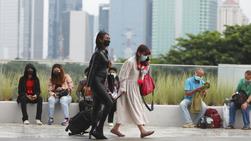 People wear face masks the help protect against the coronavirus along a skywalk in Jakarta, Indonesia on Dec 30, 2021. (ACHMAD IBRAHIM / AP)
People wear face masks the help protect against the coronavirus along a skywalk in Jakarta, Indonesia on Dec 30, 2021. (ACHMAD IBRAHIM / AP)
Indonesia
More than 85 percent of Indonesia's population has antibodies against COVID-19, a government-commissioned survey showed, but epidemiologists warned it was not clear whether this immunity could help contain a fresh wave of coronavirus infections.
The survey, conducted between October and December by researchers at the University of Indonesia, found Indonesians had developed antibodies from a combination of COVID-19 infections and vaccinations.
Pandu Riono, an epidemiologist involved in the survey that covered some 22,000 respondents, said the level of immunity could explain why there had not been a significant jump in COVID-19 infections since the middle of 2021.
Indonesia's second wave of infections - driven by the Delta variant - peaked in July and August, with infections plummeting from more than 50,000 a day to just a few hundred a day in recent months.
The antibodies may provide some protection against new variants, including the highly contagious Omicron, Pandu said, though adding it would take months for this to become clear.
Omicron has infected more than 250 people in Indonesia, but most cases have been imported and a handful of local cases have not so far brought the type of surge recorded in many countries.
Indonesia has only fully vaccinated just over 42 percent of its population of 270 million people.
The survey's findings were still being examined to assess how different brands of vaccines might contribute to different levels of antibodies, Pandu said.
Dicky Budiman, an epidemiologist at Australia's Griffith University, who was not involved in the survey, said the findings should be treated cautiously since Indonesia's vaccination rates lagged many countries and there was no guarantee how long antibodies might last.
 An Ultra-Orthodox Jewish man walks past a coronavirus vaccination center in Jerusalem, Dec 22, 2021. (ODED BALILTY / AP)
An Ultra-Orthodox Jewish man walks past a coronavirus vaccination center in Jerusalem, Dec 22, 2021. (ODED BALILTY / AP)
Israel
Only two cases of myocarditis were reported in Israel among 44,000 youngsters aged 12 to 15 who received a third dose of the Pfizer/BioNtech vaccine, the Health Ministry said on Wednesday.
The heart inflammations developed by two male teens were both mild, the ministry said.
Studies have shown that while the Pfizer/BioNTech COVID-19 vaccine marginally increases the risk of heart inflammation, the risk is higher among those infected with the coronavirus.
Israel has played a leading role in studying the effects of COVID-19 vaccines, as the fastest country to roll out two-dose inoculations to a wide population a year ago and one of the first to give third shots as boosters.
It is now administering fourth doses to people over 60, health workers and immunocompromised patients.
Around 60 percent of Israel's 9.4 million population is fully vaccinated, nearly all with the Pfizer/BioNTech shot, meaning they have either had three doses or are within six months of their second dose.
The Health Ministry on Wednesday changed its testing and quarantine regulations in what it described as an effort to protect vulnerable populations as infections fuelled by the Omicron coronavirus variant have soared.
Daily cases hit a record high on Tuesday with nearly 12,000 infections reported and they are expected to continue rising over the next few weeks. Hospitalizations have also climbed but at a slower pace.
 A vehicle leaves the US Marine Corps' Camp Hansen, in Kin, Okinawa prefecture, southern Japan, on Jan 5, 2022. (KYODO NEWS VIA AP)
A vehicle leaves the US Marine Corps' Camp Hansen, in Kin, Okinawa prefecture, southern Japan, on Jan 5, 2022. (KYODO NEWS VIA AP)
Japan
US military bases in Japan introduced stricter COVID-19 measures on Thursday after the government expressed grave concern about a surge of new infections and called for restrictions on the movement of US personnel.
Japan is facing what some are calling its sixth wave of coronavirus infections with cases in some places at their highest in months. One official has blamed US military personnel for spreading the Omicron variant.
US Forces Japan said that due to an increase in COVID-19 cases at US installations and throughout Japan it was establishing more stringent mitigation measures including requiring US military personnel to wear masks off base and for stricter testing.
"The mitigation measures we have instituted ... are intended to protect our force's readiness, the well-being of our families, and the health of Japan’s citizens," the force said in a release.
"We recognize we all have a part to play in keeping our communities safe."
There are more than 100,000 US service members, dependents and contractors in Japan.
Earlier, Foreign Minister Yoshimasa Hayashi asked US Secretary of State Antony Blinken for US service members to be restricted to their bases, Chief Cabinet Secretary Hirokazu Matsuno told reporters.
Matsuno said Japan was "gravely concerned" about COVID-19 infections at US bases.
The southern prefecture of Okinawa, host to 70 percent of US military facilities in Japan, is at the epicentre of Japan's latest surge of cases and it asked the central government on Thursday to impose new restrictions, known as quasi-emergency measures, which would likely include limiting the opening hours of restaurants and bars.
Announcing the request, Okinawa Governor Denny Tamaki said new cases there were expected to surge to 980 on Thursday from 623 the day before.
Tamaki told reporters this week he was "furious" about what he called inadequate infection controls at US bases that allowed the Omicron variant to spread to the public.
Japan halted the entry of almost all foreign travelers in late November after the World Health Organization listed Omicron as a variant of concern.
But the US military moves staff in and out under a separate testing and quarantine regime.
A US Marine Corps station in the prefecture of Yamaguchi, in western Japan, said it discovered 115 new cases on Wednesday, after 182 the previous day.
Mongolia
Mongolia registered 795 new COVID-19 cases over the past 24 hours, the highest daily increase since Nov. 18, bringing the national count to 392,984, the country's health ministry reported on Thursday.
The number of daily infections in the country has been resurging due to New Year celebrations, according to the ministry.
Two more COVID-19 patients died in the past day, raising the national death toll to 1,994.
Pakistan
Pakistan reported more than 1,000 new COVID-19 cases during the past 24 hours after a period of nearly three months, the National Command and Operation Center (NCOC) said on Thursday.
The NCOC said the country confirmed 1,085 new COVID-19 cases, increasing the overall cases to 1,299,848 so far, including 1,257,847 recoveries.
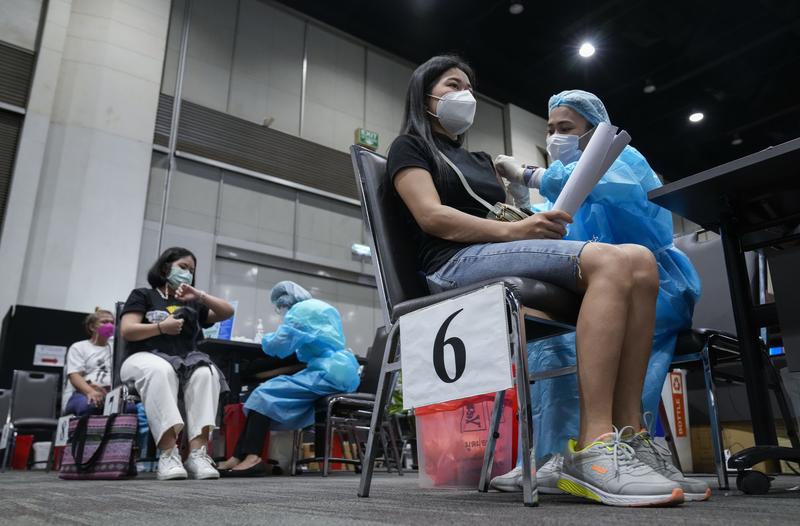 A health worker administers a dose of the AstraZeneca COVID-19 vaccine in Bangkok, Thailand, Nov 17, 2021. (SAKCHAI LALIT / AP)
A health worker administers a dose of the AstraZeneca COVID-19 vaccine in Bangkok, Thailand, Nov 17, 2021. (SAKCHAI LALIT / AP)
Thailand
Thailand on Thursday raised its COVID-19 alert level following rising infections driven by the spread of the Omicron variant of the coronavirus, a senior health official said.
The change, from level three to four, sets a pretext for possible measures that could follow, such as closing high-risk areas and placing restrictions on domestic travel or public gatherings.
"Thailand has entered a new wave of infections, where new cases will be rising fast," said Kiattiphum Wongrajit, permanent secretary of the health ministry.
"Level four means we may close high-risk places and announce more measures."
The move comes amid a sharp rise in daily infections since the beginning of the year.
Thailand reported 5,775 new cases on Thursday, a 48 percent rise on the previous day and nearly double the number on Jan 1.
The Southeast Asian country has vaccinated about 69.1 percent of an estimated 72 million people living in the country with two doses, but only 10.9 percent have received booster shots.
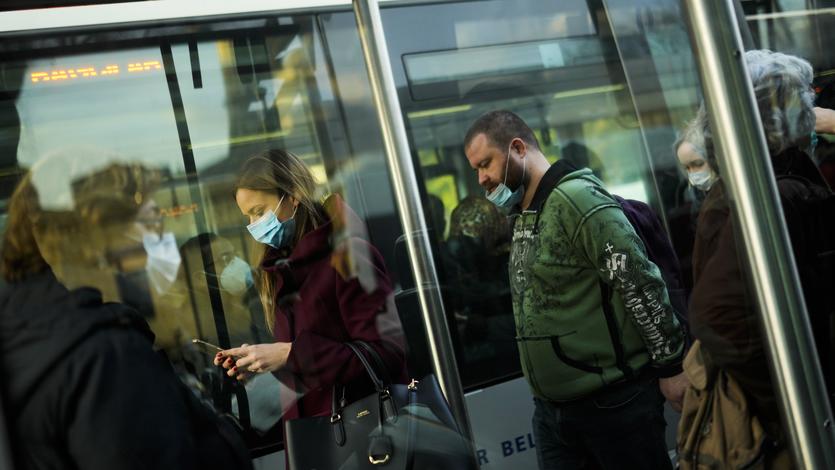 Commuters, wearing protective face masks to prevent the spread of COVID-19, get out of a streetcar in Istanbul, Turkey, Dec 27, 2021. (FRANCISCO SECO / AP)
Commuters, wearing protective face masks to prevent the spread of COVID-19, get out of a streetcar in Istanbul, Turkey, Dec 27, 2021. (FRANCISCO SECO / AP)
Turkey
Turkey recorded 66,467 new COVID-19 cases in the last 24 hours, the highest daily figure on record, health ministry data showed on Wednesday, as infections surge due to the Omicron variant of the coronavirus.
It also recorded 143 COVID-related deaths in the same period, the data showed. Cases in Turkey have more than doubled in just over a week as the Omicron variant became dominant in the country.
Health Minister Fahrettin Koca has said the government was not considering new restrictions for now, urging citizens to get vaccinated and increase personal safety measures. Officials have also said schools would remain open.
"Despite the rise in infections due to the Omicron variant, there is no worrying rise in hospitalization rates," Koca said on Twitter on Wednesday.
In a statement after meeting his coronavirus science council later on Wednesday, Koca urged citizens to avoid crowded places, locations without ventilation, and long gatherings, adding there was no reason for concern yet.
He also announced a revision to COVID-19 quarantine periods.
"The quarantine period for positive cases has been set as 7 days. After 7 days, those showing light or no symptoms will end their quarantine period. In the event positive cases get tested on the fifth day and if they turn negative, their quarantine ends," he said.
Vietnam
Vietnam's health ministry has licensed three local pharmaceutical firms to produce COVID-19 treatment Molnupiravir pills, state media said on Thursday.
The firms are Boston Pharma, Stella and Mekophar, Tien Phong newspaper cited the ministry as saying.


